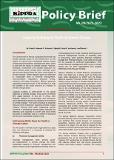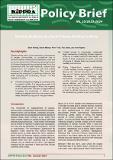Policy Brief No. 09 of 2022-2023 on Capacity Building for Youth in Climate Change
| dc.date.accessioned | 2023-01-26T06:37:11Z | |
| dc.date.available | 2023-01-26T06:37:11Z | |
| dc.date.issued | 2022 | |
| dc.identifier.uri | https://repository.kippra.or.ke/handle/123456789/4056 | |
| dc.description.abstract | The Government of Kenya recognizes the threat that climate change poses to the environment. In this regard, the government developed various climate change response policies, strategies and action plans to deal with the impact of climate change. However, individual, institutional and societal capacities for youth climate action remain weak, although youth are the ones who will bear the future costs related to climate change.1 These capacity gaps are attributed to inadequate skills in financial management, communication, negotiation, proposal writing, research and policy formulation. Without adequate capacities among the youth, it will be difficult to reap the benefits of the youth dividend as it relates to climate change action. | en |
| dc.language.iso | en | en |
| dc.publisher | The Kenya Institute for Public Policy Research and Analysis (KIPPRA) | en |
| dc.relation.ispartofseries | PB/09/2022-2023 | |
| dc.subject | Capacity Building | en |
| dc.subject | Climate Change | en |
| dc.subject | Climate Action | en |
| dc.subject | Policy Formulation | en |
| dc.subject | Skills Gaps for Youth | en |
| dc.title | Policy Brief No. 09 of 2022-2023 on Capacity Building for Youth in Climate Change | en |
| dc.type | KIPPRA Publications | en |
| ppr.contributor.author | Orwa, B.; Mwende, P.; Kimaiyo, F. & Ngugi, R. | en |
Files in this item
This item appears in the following Collection(s)
-
Policy Briefs [165]



